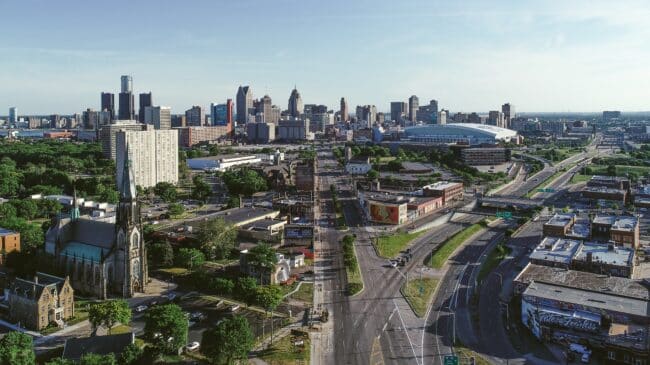The need to “fix the damn roads,” as Gov. Gretchen Whitmer put it, is a growing political and economic concern in Michigan, as the state faces a long list of transportation needs but also billion-dollar annual transportation funding shortfalls in coming years. Part of the funding gap is due to the projected growth of hybrid and electric vehicles, which use less fuel or no fuel at all. Less fuel used means less gas tax revenue for Michigan to pay for roads and bridges.
With the revenue hole growing, the state legislature funded the Michigan Department of Transportation (MDOT) to commission a major study on whether 21st-century tolling could help rebuild the state’s highways. The study published in January offered good news. Tolls could pay for $18.5 billion worth of reconstruction and modernization on 945 miles of nine major highways at no cost to Michigan taxpayers. And with toll revenues paying for those major infrastructure projects, MDOT could shift its existing funds to pay for other highway improvements statewide.
The study was done by consulting firms HNTB and CDMSmith, which have considerable experience with highways and tolling nationwide. They proposed an all-electronic tolling system with windshield-mounted toll tags that can be read as vehicles pass beneath gantries at highway speed—no old-fashioned toll booths. The toll tag would be compatible with the E-ZPass electronic tolling system now operational in most of the Northeast, Midwest, and Florida.
Over the past 20 years, recognizing that aging highways and bridges need a sustainable funding source to pay for costly reconstruction and maintenance, Congress has allowed tolling to be used for some projects on Interstate highways. For most of Michigan’s Interstate corridors, the HNTB study opted for the funding program under which aging bridges can be reconstructed using toll finance.
While a recent report from the Citizens Research Council questioned the legality of that method of tolling, when HNTB proposed utilizing this same approach in Indiana in 2018, it noted that Indiana’s transportation department had discussed it with the Federal Highway Administration, which did not object. So HNTB is on solid ground in proposing this, and Michigan should be able to negotiate a tolling agreement with the Federal Highway Administration.
If Michigan does proceed with the tolling plan, its best approach might be to link it to another state and federal objective: the long-term replacement of per-gallon fuel taxes with per-mile charges. As electric vehicles make the gas tax unsustainable, Congress has given many states, including Michigan, grants to test potential methods of replacing gas taxes. If the new tolls on the nine highway corridors were defined as the first stage of Michigan’s conversion from the per-gallon gas tax to per-mile charges, the state would move into the forefront of states planning such transitions.
Of course, the key word here is “replacing.” Drivers and truckers are rightly concerned about avoiding double taxation. So, to make tolls a replacement for state gas and diesel taxes, Michigan would have to provide refunds of fuel taxes to motorists and truckers paying new per-mile charges. This could easily be done via the electronic tolling system, which charges for the miles driven, from on-ramp to off-ramp. The amount of fuel used would be calculated based on a vehicle’s highway miles-per-gallon rating. When multiplied by the applicable gas tax rate, the refund owed would be established and paid back to drivers.
Along these lines, the HNTB report suggested the possibility of refunds for some toll-road users. It noted that trucks using the Massachusetts Turnpike and the New York Thruway, both tolled, can obtain refunds of certain state highway user taxes, so the technology already exists and is in use.
Michigan’s highways need fixing, but the state is woefully short of the transportation funding required. The state must also figure out how to replace declining gas tax revenues with a reliable funding source for roads and bridges in the coming years. The ways the new tolling study proposes to address these vital infrastructure needs would improve Michigan’s highways and bridges and should be pursued.

